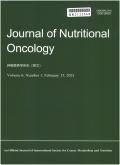Role of Hepatocyte Nuclear Factor 4α in Regulating Hepatic Differentiation and the Inflammatory Response in HCC
引用次数: 1
Abstract
Wen Li Zhou and Zhan Wang made an equal contribution to this paper. Corresponding authors: Wen Li Zhou, MD, PhD, Department of Medical Oncology, Changzheng Hospital, Navy Medical University, Shanghai 200070, China; Tel:+86 216 654 0109; Email: doctorwinly@126. com; Yuan sheng Zang, MD, PhD, Department of Medical Oncology, Changzheng Hospital, Navy Medical University, Shanghai 200070, China; Tel:+86 216 654 0109; Email: doctorzangys@163.com Introduction According to the cancer statistics released by the National Cancer Center in 2018, the annual incidence of primary hepatocellular carcinoma (HCC) in China was 466,000, accounting for about 55% of the global cases of the disease [1]. Surgical resection can be effective for the treatment of HCC, but most patients already have local dissemination or distant metastasis at the time of diagnosis, limiting the efficacy of surgery. Although there are several some other options for the treatment, they have limited benefit. For example, the overall survival (OS) in one study of patients treated with sorafenib for HCC compared with placebo was 10.7 vs 7.9 months [2]. In another phase 3 trial done at 152 sites in 21 countries, the median survival for patients treated with regorafenib following progression on sorafenib was increased by 2.8 months (10.6 vs 7.8) compared with the placebo control group [3]. The median OS of the commonly-used chemotherapy regimen, FOLFOX4, was only 6.4 months [4]. These studies demonstrate that the efficacy of targeted cancer therapies and chemotherapy for advanced HCC is relatively limited. In recent years, the research and application of immunological checkpoint therapy has been increasing exponentially, but more work is necessary to make these approaches more effective. These shed the light on hunting for alternative therapeutic strategies. Based on the biology of tumors, especially from the studies of pathways capable of controlling cell fate programs, induced differentiation strategies have been developed as a novel strategy. Poor differentiation is an important hallmark of cancer cells. It has been increasingly recognized that liver cancer stem cells (LCSCs) are responsible for the carcinogenesis, recurrence and metastasis in HCC. The induced differentiation of LCSCs represents a new idea for the treatment of HCC. In addition, based on an analysis of whole-gene expression, it has been reported that the activation of embryonic stem cell (ESC)-like transcription is involved in hepatocellular carcinoma and strongly predicts early recurrence and metastasis [5-7]. These stem cells and stem celllike patterns of gene expression represent new target for HCC therapy. Many studies have suggested that hepatocyte nuclear factor 4α (HNF 4α) is a promising target for inducing hepatic differentiation as a treatment for HCC. We herein review the roles of HNF 4α in regulating hepatic metabolism and the inflammatory response, aiming to provide some ideas on induced hepatic differentiation therapy.肝细胞核因子4α在肝细胞癌中调节肝分化及炎症反应中的作用
周文立和王战对本文的贡献相同。通讯作者:周文丽,医学博士,海军医科大学长征医院肿瘤科,上海200070;电话:+86 216 654 0109;电子邮件:doctorwinly@126。com;张元生,医学博士,海军医科大学长征医院肿瘤科,上海200070;电话:+86 216 654 0109;根据国家癌症中心发布的2018年癌症统计数据,中国原发性肝细胞癌(HCC)年发病率为46.6万例,约占全球该疾病病例的55%。手术切除可以有效治疗HCC,但大多数患者在诊断时已经有局部播散或远处转移,限制了手术的疗效。虽然还有其他几种治疗方法,但它们的效果有限。例如,在一项研究中,接受索拉非尼治疗HCC的患者与安慰剂相比,总生存期(OS)为10.7个月vs 7.9个月。在21个国家152个地点进行的另一项3期试验中,与安慰剂对照组相比,在索拉非尼进展后接受regorafenib治疗的患者的中位生存期增加了2.8个月(10.6 vs 7.8)。常用化疗方案FOLFOX4的中位OS仅为6.4个月。这些研究表明,靶向癌症治疗和化疗对晚期HCC的疗效相对有限。近年来,免疫检查点疗法的研究和应用呈指数级增长,但要使这些方法更有效,还需要做更多的工作。这为寻找替代治疗策略提供了线索。基于肿瘤的生物学特性,特别是对控制细胞命运程序的途径的研究,诱导分化策略作为一种新的策略得到了发展。分化差是癌细胞的一个重要标志。肝癌干细胞(liver cancer stem cells, LCSCs)在HCC的发生、复发和转移中起着重要的作用,这一点已被越来越多地认识到。诱导LCSCs分化为HCC治疗提供了新的思路。此外,基于全基因表达分析,有报道称胚胎干细胞(ESC)样转录的激活参与肝细胞癌,并强烈预测早期复发和转移[5-7]。这些干细胞和干细胞样基因表达模式代表了HCC治疗的新靶点。许多研究表明,肝细胞核因子4α (hnf4α)是诱导肝分化作为HCC治疗的一个有希望的靶点。本文就hnf4α在调节肝脏代谢和炎症反应中的作用进行综述,以期为肝分化诱导治疗提供一些思路。
本文章由计算机程序翻译,如有差异,请以英文原文为准。
求助全文
约1分钟内获得全文
求助全文

 求助内容:
求助内容: 应助结果提醒方式:
应助结果提醒方式:


